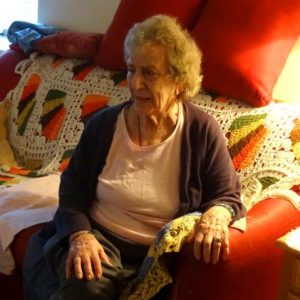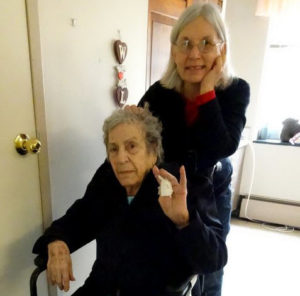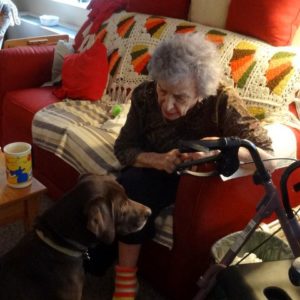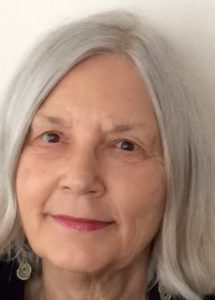My last blog ended with questions about steps to take after my mother-in-law Virginia became a Hospicare patient. Even though I’m a Hospicare volunteer, I didn’t know we would receive so much practical and emotional support.
Should my elderly family member stay in her own apartment?
 When I told our Hospicare social worker how much money remained in Virginia’s accounts, she advised me to consider a move.
When I told our Hospicare social worker how much money remained in Virginia’s accounts, she advised me to consider a move.
“You need to deal with this,” she said. “If a patient is already on Medicaid rather than private pay, nursing home placement is more difficult. You may not get to choose the place you want.”
I was grateful to know, but unhappy about the tasks ahead. I didn’t want to gather and organize five years of financial records for Medicaid application. I didn’t want to clean out Virginia’s apartment and deal with her possessions. I didn’t want to upset Virginia by moving her out of her apartment where she had 24-hour private care.
While dealing with Virginia’s day-to-day needs, I’d avoided making definite plans for her future. I hadn’t imagined she would outlive her funds, but she turned 102 in January. We couldn’t continue on the same path because we couldn’t pay for it. Virginia would need Medicaid support by early summer. I learned that having money to pay for private care for even a few months gave us better choices, so I knew it was time to move.
Making a Move
 I talked with our Hospicare social worker on Tuesday, talked to the nursing home social worker on the phone on Wednesday, had application forms sent by email and filled out by Friday when I visited the nursing home. The nursing home social worker said a rehab patient would leave on Monday, so they had a bed available for a private pay patient. She had no idea when they’d be able to accept another patient since the facility is small.
I talked with our Hospicare social worker on Tuesday, talked to the nursing home social worker on the phone on Wednesday, had application forms sent by email and filled out by Friday when I visited the nursing home. The nursing home social worker said a rehab patient would leave on Monday, so they had a bed available for a private pay patient. She had no idea when they’d be able to accept another patient since the facility is small.
I decided it would lessen the pain to give the health aides severance pay and move quickly. With my head spinning, I said yes to the inevitable.
Hospicare Support during and after the Move
The first issue was how to move Virginia physically. Our hospice social worker told me Hospicare would arrange a wheelchair transport with Bang’s Ambulance Services. On Monday morning, the ambulance driver arrived. With me carrying clothing and personal items and a good friend with us for support, Virginia and I entered her new world.
A Hospicare nurse continued weekly visits at the nursing home. Virginia received visits from the same volunteer who brought her therapy dog along. I hired Virginia’s main health aide from her old residence to visit, and I visited often. With daily support, Virginia made the transition fairly easily. Maybe short-term memory loss helped.
Getting Help with Medicaid Applications and More
After moving Virginia, I hired her previous health aide to empty and clean her apartment. I also got help from my son and a few of his friends. One step at a time and a few weeks later, we handed in the keys and left Virginia’s old life behind.
At the same time, I changed Virginia’s mailing address, cancelled her phone and cable service, and transferred her investments to one easy to access account. The nursing home suggested a Medicaid adviser who works with their patients. After an email conversation in early March, I gathered the needed information. In a few weeks with Hospicare helping me over the bumps, I had most of the needed information and knew the rest was on the way.
Should I Talk with Virginia about her Son’s Death?
 Although Virginia first refused to talk to the Hospicare spiritual advisor, I convinced her to give it a chance. This wonderful counselor asked Virginia if she would talk to a priest. Virginia said yes. After ten years of being angry that her God didn’t save her son from cancer, Virginia began making peace with her spiritual roots.
Although Virginia first refused to talk to the Hospicare spiritual advisor, I convinced her to give it a chance. This wonderful counselor asked Virginia if she would talk to a priest. Virginia said yes. After ten years of being angry that her God didn’t save her son from cancer, Virginia began making peace with her spiritual roots.
The Hospicare physician advised our family to speak to Virginia openly about her son’s death since the dying often wait for someone they love so they can say goodbye. With a little prompting and some tears, Virginia began talking about her only child’s death. Her grief surfaced without the anger she’d expressed in the past. Even at 102, a new perspective came in about mortality. After asking about her son and others who had died, she said, “We live and then we die.” She repeated this phrase many times.
“It’s such shame,” she said. “I loved him with all my heart.” After that first breakthrough, Virginia continued to ask, “Where’s Vic?” We repeated the conversation as she made peace with the most crushing loss of her life.
In six weeks, we’d made necessary moves with the minimum of upset for Virginia. I’d worked hard, but those steps had to happen sooner or later. Virginia was in a kind and safe residence where it’s easy for me to visit. With Hospicare advisors, we had constant support through this transition. Not just support for Virginia, but support for me.
Virginia continues her slow decline with some weight loss and more sleeping. As you might imagine, I’m sleeping better, too.
***

Bio: Elaine Mansfield’s book Bio: Elaine Mansfield’s book Leaning into Love: A Spiritual Journey through Grief won the 2015 Independent Publishers Book Award Gold Medal for Aging, Death, and Dying. Her TEDx talk is “Good Grief! What I Learned from Loss.” Elaine gives presentations and workshops and has been a Hospicare volunteer since 2009 in a variety of roles. You’ll find her blog at https://elainemansfield.com/blog/. For more information about Elaine’s work, see her website.